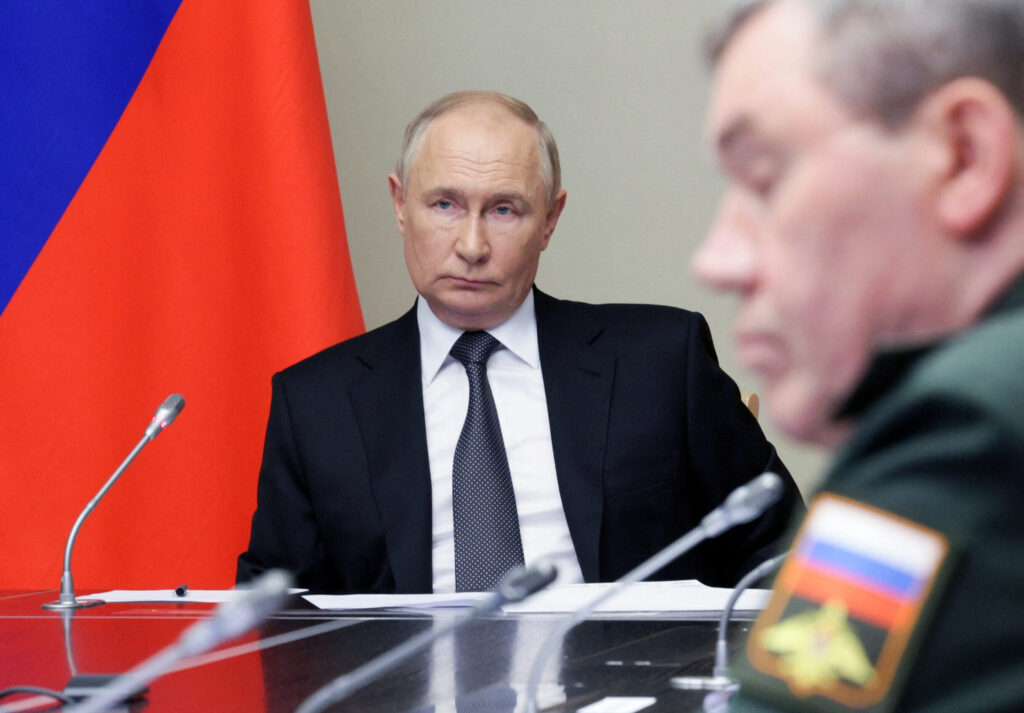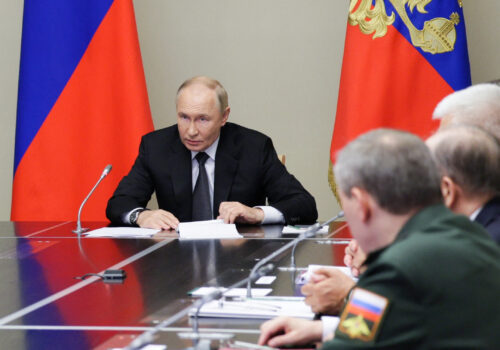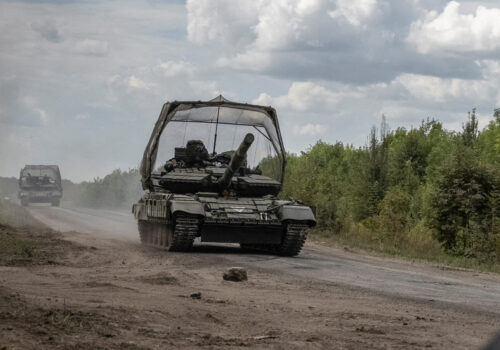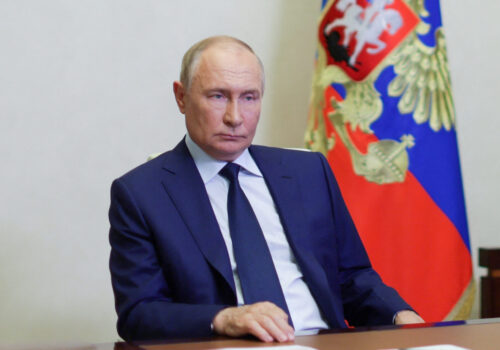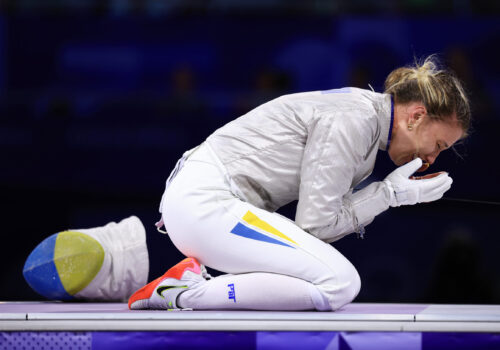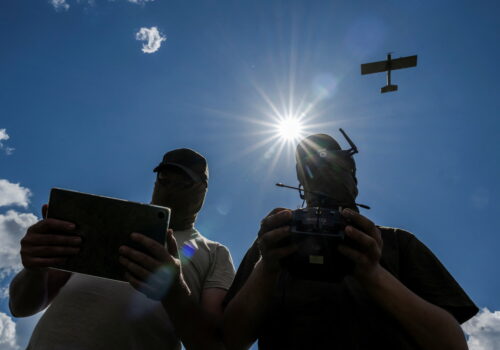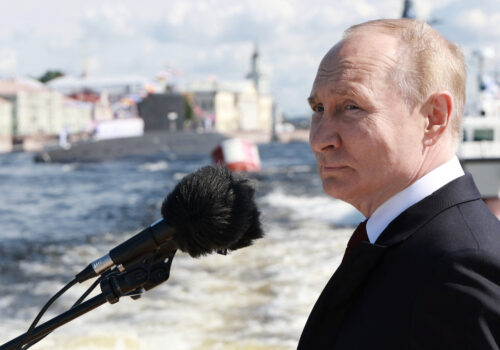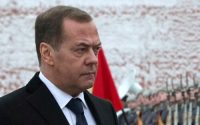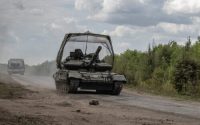
Invasion? What invasion? Putin is downplaying Ukraine’s Kursk offensive
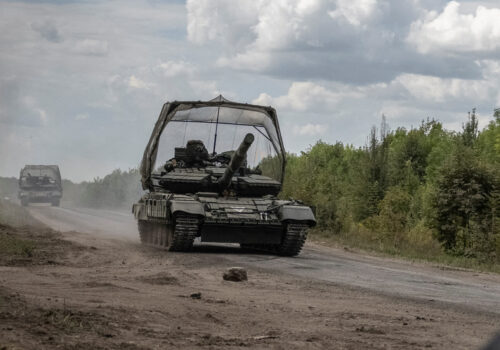
In the space of just two weeks, Ukraine has claimed more Russian land than Putin’s army managed to seize in Ukraine since the start of 2024. Kyiv’s bold summer offensive caught the Kremlin completely off-guard and has transformed perceptions of a war that many believed was moving slowly but surely toward an inevitable Russian victory. Rarely in the history of modern warfare has any military succeeded in pulling off such a stunning surprise.
Since Ukraine’s invasion of Russia first began on August 6, it has dominated the international headlines and has been one of the top news stories around the world. Everywhere, that is, except Russia itself. While the global press has been reporting breathlessly on the first invasion of Russia since World War II, the Kremlin-controlled Russian media has been instructed to minimize the significance of the Ukrainian offensive.
This strategy has been all too evident on Russia’s federal TV channels throughout the past fortnight, with comparatively little coverage of Ukraine’s cross-border operation. Any mentions have typically been accompanied by euphemistic references to “the situation” or “events in Kursk region.” The Kremlin’s intense discomfort was perhaps most immediately obvious on last weekend’s episode of Russia’s flagship current affairs TV show, Sunday Evening with Vladimir Solovyov, with Russian MP and studio guest Andrey Gurulyov declaring, “the most important thing is for everyone to shut up.”
Stay updated
As the world watches the Russian invasion of Ukraine unfold, UkraineAlert delivers the best Atlantic Council expert insight and analysis on Ukraine twice a week directly to your inbox.
Russia’s propagandists are taking their lead from Putin himself. The Kremlin dictator has remained remarkably tight-lipped over Ukraine’s invasion, and has limited himself to only a handful of public statements. Notably, there have been no attempts to rally the Russian people against the invader or engage in the kind of historical grandstanding that Putin normally favors. On the contrary, he has opted for a strikingly understated approach. Putin initially branded the invasion a “large-scale provocation,” and has since compared the advancing Ukrainian army to “terrorists.”
In recent days, Putin has sought to underline his apparent lack of concern over the invasion of Russia by embarking on a series of routine trips. First, he flew to Azerbaijan for a two-day visit that focused on strengthening bilateral trade ties. Next, he paid his first visit to Chechnya for thirteen years. Neither journey was urgent or in any way connected to Ukraine’s ongoing offensive.
Despite this very deliberate show of indifference, there have been numerous indications that Putin is in reality extremely rattled by the Ukrainian invasion. His evident disdain over the past fortnight while listening to Russian military commanders reporting fake battlefield victories has inspired multiple memes. In one particularly revealing exchange, Putin angrily interceded during a televised government meeting when the acting governor of Kursk region dared to disclose the scale of Ukraine’s territorial gains.
This behavior is nothing new. Indeed, Putin has long been notorious for going missing during times of national crisis, and has added to this unwanted reputation with numerous disappearing acts throughout the invasion of Ukraine. Nevertheless, the unprecedented nature of Ukraine’s own counter-invasion makes his recent posture particularly revealing.
READ MORE COVERAGE OF THE KURSK OFFENSIVE
The Russian ruler’s underwhelming response to Ukraine’s Kursk offensive can be at least partially explained by his genuine shock at what was a totally unexpected turn of events. Crucially, he may also have concluded that the present military situation leaves him with little choice.
Ukraine’s ongoing invasion has exposed the Russian military as dangerously overstretched. With his army fully committed and advancing at great cost in eastern Ukraine, Putin has no significant reserves to call upon and is deeply reluctant to withdraw his best units in order to protect Kursk Oblast. Instead, he is attempting to plug the gap with a ragtag collection of conscripts scraped together from across the Russian Federation. Faced with a choice between conquering Ukraine or defending Russia, it is becoming increasingly obvious that Putin cannot do both.
Eurasia Center events
In the current circumstances, the Russian ruler may feel his best option is to downgrade Ukraine’s invasion to the level of border skirmish and pretend it is nothing to worry about. With the help of his formidable propaganda machine, this approach may indeed prevent panic from spreading inside Russia. Even so, there is no escaping the fact that by occupying more than one thousand square kilometers of Russian territory, Ukraine has dealt a serious blow to Putin’s strongman image and made a mockery of Russia’s claims to military superpower status. If this situation persists, it will also fatally undermine his ability to intimidate the international community.
Since the onset of Russia’s full-scale invasion in February 2022, Putin has skillfully employed nuclear blackmail together with frequent warnings of Russian red lines to deter the West from supporting Ukraine. His bully boy approach has proved highly effective, with Western leaders consistently delaying decisions on new categories of military aid for Kyiv and imposing absurd restrictions on Ukraine’s ability to use Western weapons inside Russia. However, this may be about to change. Ukraine’s invasion of Russia has demonstrated that it is possible to cross the reddest of all Russian red lines without sparking World War III. As a consequence, many are now concluding that Putin’s saber-rattling is mere bluster.
Ukrainian President Volodymyr Zelenskyy has seized on the Kremlin’s weak response to his counter-invasion. He is now arguing that the time has come to abandon the concept of escalation management entirely, and is calling on Kyiv’s allies to lift all restrictions on attacks inside Russia. “The whole naive, illusory concept of so-called red lines regarding Russia, which dominated the assessment of the war by some partners, has crumbled these days somewhere near Sudzha,” Zelenskyy commented on August 20, referencing the largest Russian town currently under Ukrainian occupation.
So far, the US and other key allies have yet to revise existing weapons restrictions or announce any upgrade in arms deliveries to Ukraine. But if Putin continues to downplay the invasion of Russia while failing to retaliate in a manner befitting his country’s superpower pretensions, it will be increasingly difficult to justify the excessive caution that has shaped the international response to Russia’s war. Putin succeeded in bluffing the world for almost two-and-a-half years, but Ukraine has now called his bluff in the most emphatic manner.
Peter Dickinson is editor of the Atlantic Council’s UkraineAlert service.
Further reading
The views expressed in UkraineAlert are solely those of the authors and do not necessarily reflect the views of the Atlantic Council, its staff, or its supporters.

The Eurasia Center’s mission is to enhance transatlantic cooperation in promoting stability, democratic values and prosperity in Eurasia, from Eastern Europe and Turkey in the West to the Caucasus, Russia and Central Asia in the East.
Follow us on social media
and support our work
Image: Russia’s President Vladimir Putin chairs a meeting with security officials and regional governors to discuss Ukraine’s invasion of Russia. August 12, 2024. (Sputnik/Gavriil Grigorov/Kremlin via REUTERS)
